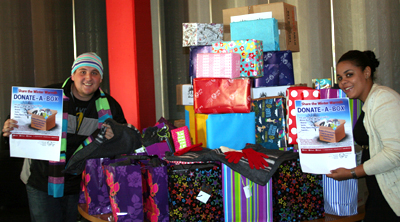 |
|
Michael van Niekerk and Melissa Lucas, prime of Akasia, making up the packages.
Photo: Linda Fekisi
14 June 2013 |
It goes without saying that winter in Bloemfontein is scarcely pleasant, especially if you do not have the proper clothing. Members of the Kovsie community have taken a step towards giving a helping hand to those in need. Share the Warmth Winter wonder box is a project that was launched by the SRC City Residences and Commuter students to help keep the cold away. Students and staff of the University of the Free State (UFS) donate a package which includes a blanket, beanie, gloves, socks and sweets, to be handed out to the children in need.
Share the Warmth Winter is the brainchild of Michael van Niekerk who is the SRC member in charge of the portfolio. He received the idea for such a project from an initiative he is a part of at Mooiplaas Township. “People make shoeboxes with presents inside for children and hand them out during Christmas. I thought it would be a great idea to share the warmth in winter, especially in the freezing Free State,” he said.
The team managed to collect more than 100 items in just a few weeks. The distribution of the boxes will take place around the Bloemfontein area. Teams will visit shelters, while others will hand out the boxes directly to children in places like Heidedal and downtown.
“I am very delighted by the response and think that this is something that needs to grow bigger and bigger to include the entire Bloemfontein every winter,” said Michael when asked if it is a once-off project. People who would like to bring warmth to the little ones, can still send boxes or packages to the SRC Building or send an email to vanniekerkm@ufs.ac.za for more information.